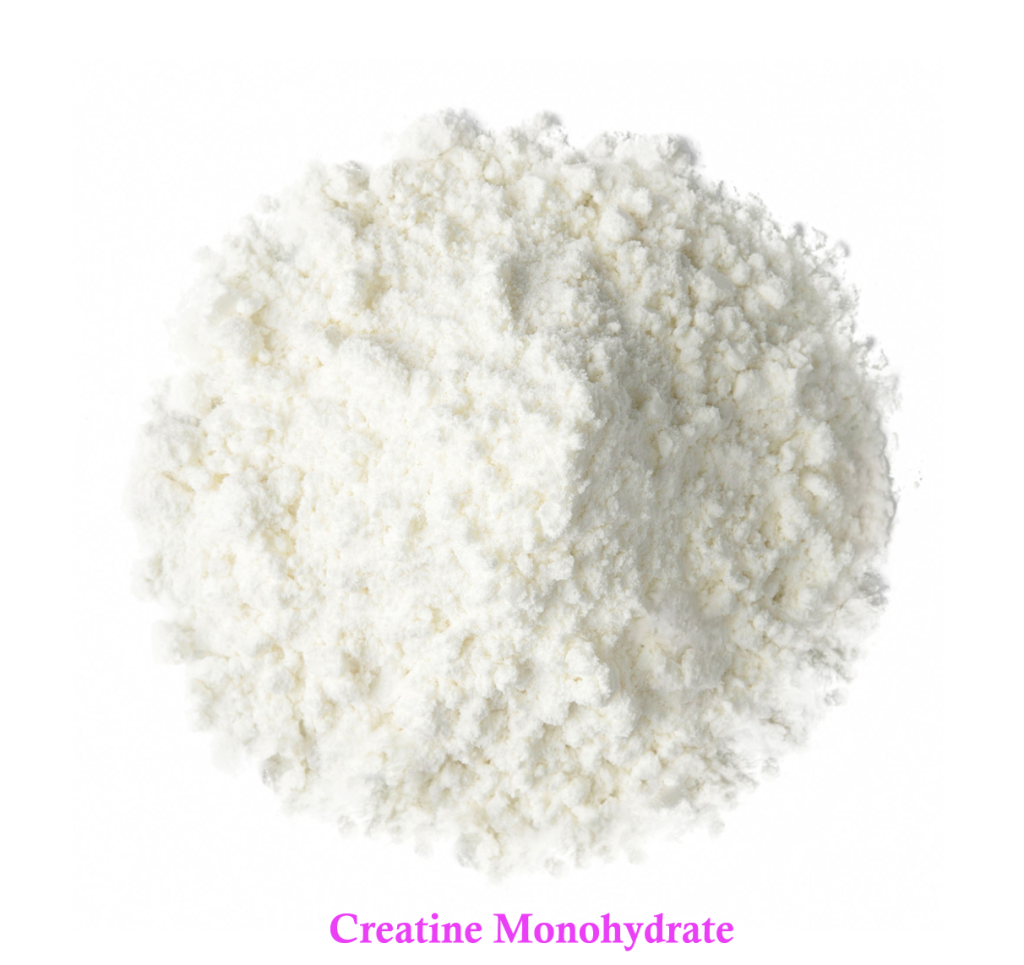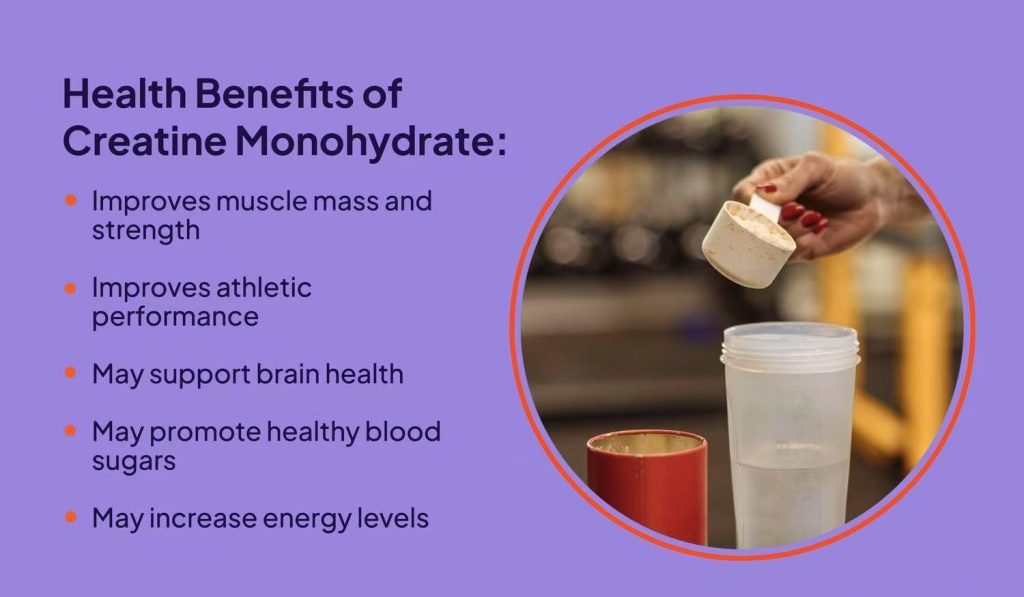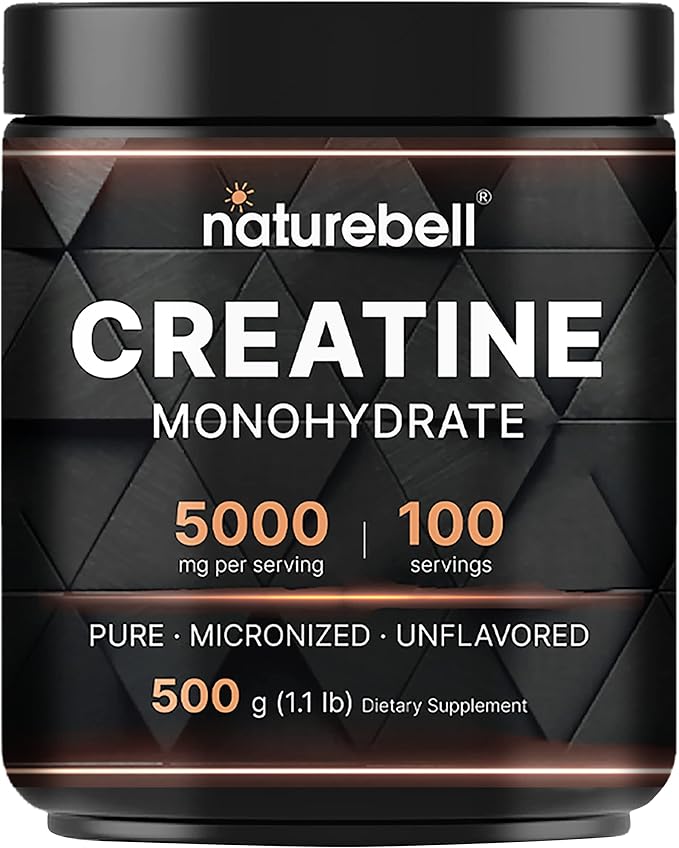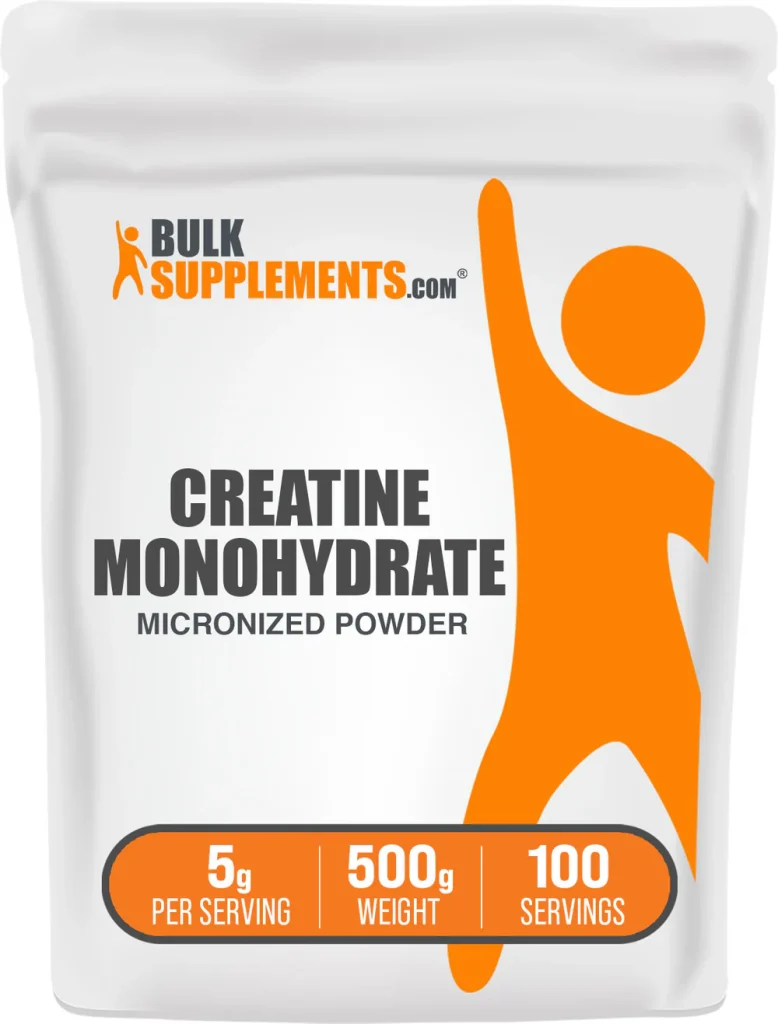What’s Creatine Monohydrate ?

Creatine monohydrate has become one of the most popular performance supplements for athletes and avid weight lifters. It helps introduce more creatine to your body—a substance that plays a role in cellular health and aids in muscle growth. Of all creatine supplements, creatine monohydrate is the most commonly sold and studied.
Most people get creatine partly from the body’s natural production of it and partly from eating red meat and seafood. However, supplementing with creatine monohydrate may provide additional benefits, and not just for athletic performance and strength.
Improves Muscle Mass and Strength

Creatine Monohydrate is best known for its role in building muscle mass and strength. About 95% of your body’s creatine is stored in your muscles and the exact amount you have varies based on your diet and activity level. Supplementing creatine can increase muscle creatine levels, which is especially helpful if you don’t eat dietary sources of creatine like red meat and seafood.
There are many studies on creatine’s effects on muscle strength. A recent research review found that creatine was especially effective at promoting muscle growth in young healthy athletic participants.
Other studies have found that creatine’s muscular benefits aren’t just present for young athletes, but also for older adults prone to losing muscle strength and mass. When paired with resistance training, creatine supplementation can help older adults increase lean muscle mass, muscle endurance, muscle strength, and bone density.
The mechanisms for how creatine increases muscle mass aren’t completely understood. However, researchers believe that creatine helps build muscle mass by stimulating protein synthesis and affecting hormones and cytokines (small proteins) that play a key role in muscle growth.
Improves Athletic Performance
Experts in sports nutrition consider creatine monohydrate to be a highly effective supplement for athletic performance. This is due to creatine’s effect on muscle mass as well as the supplement’s ability to improve an athlete’s capacity for high-intensity exercise.
A wide body of research confirms creatine’s benefits on athletic performance. Studies have shown creatine supplementation can enhance a person’s sprint performance, anaerobic threshold, work capacity, recovery, tolerance of training, and synthesis of glycogen (a form of glucose that serves as energy storage in the body).
More research has shown creatine can improve high-intensity athletic performance by 10–20% depending on how much creatine athletes had stored in their muscles to begin with. People with the lowest creatine levels at baseline—oftentimes vegetarians—have the biggest potential for improvement from creatine supplementation.
This is partly because supplementing with creatine increases the muscular availability of creatine, which enhances exercise capacity. If you’re able to train harder, this can result in improved performance over time.
May Support Brain Health
Several studies have found that creatine may enhance cognitive function in adults of all ages. In doses ranging from 20 grams (g) a day for seven days to 5 g a day for six weeks, creatine supplementation has been shown to improve the following areas of brain health:
- Executive function
- Working memory
- Processing speed
- Mood state
- Balance
- Oxygen usage in the brain
Studies have also found improvements in mental fatigue after creatine supplementation.
This is a newer area of research on creatine supplementation, so more studies are needed to further explore these benefits.
May Promote Healthy Blood Sugars
Emerging evidence suggests creatine may improve blood sugar levels and insulin sensitivity, meaning creatine supplementation may be a helpful tool for people with type 2 diabetes.
Some research has found that creatine’s impact on blood sugar may be due to its ability to improve the secretion of insulin—the hormone that helps move sugar from your blood to your cells. Creatine may also enhance GLUT-4, a glucose transporter that helps your muscle and fat cells take in glucose.
These benefits also appear to be greater when you pair creatine supplementation with regular physical activity.
Again, this is a newer area of research with limited studies on humans, so longer-term studies and more human studies are necessary to further examine these potential benefits.
May Increase Energy Levels
Creatine Monohydrate is key for energy production in your cells, meaning it can affect your energy levels. Creatine is typically stored in the body as creatine phosphate, which helps your body replenish adenosine triphosphate (ATP). ATP is often called the “energy currency” of the cell. It fuels cell function, so having enough creatine is important for energy levels starting at the cellular level.
Research has also found that creatine supplementation may help with certain forms of fatigue. A recent study found that it may help relieve post-viral fatigue syndrome, a chronic neurological disease characterized by extreme exhaustion. However, more research is necessary since this is a newer area of interest.
How To Take Creatine Monohydrate
You can find creatine monohydrate supplements in pills or powders on its own or in combination supplements marketed for sports performance.
Some evidence suggests that taking a creatine supplement after exercise is most effective, but when you take it is likely not as important as how consistently you take it. If you want to promote muscle growth, you should take creatine every day, even on your off days, to keep muscle levels of creatine high. So whether you take it before your workout, after your workout, or at an entirely different time of day, it’s likely still beneficial.
If you’re taking a lower dose of creatine monohydrate, such as 3 g per day, it may take a few weeks to see the benefits. If you take a higher dose of around 20 g per day, you may start to see benefits within a few days.
Since creatine pulls water into your muscle cells, make sure to stay well-hydrated when you’re taking a creatine supplement. Also, creatine appears to be most effective when paired with carbohydrates, so make sure to eat enough carbohydrates when taking creatine.
Creatine monohydrate is a well-researched, generally safe supplement that’s especially helpful for building muscle and improving athletic performance. Newer research suggests it may have many more health benefits including improving blood sugar levels and supporting brain health.
Talk to your healthcare provider if you have questions about the appropriate dosing for creatine or finding a reputable supplement.



